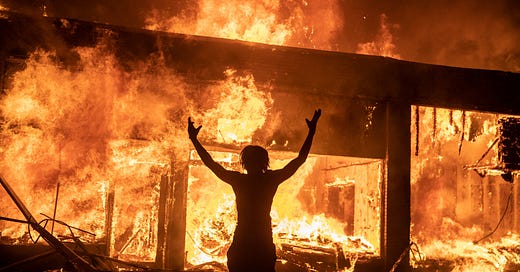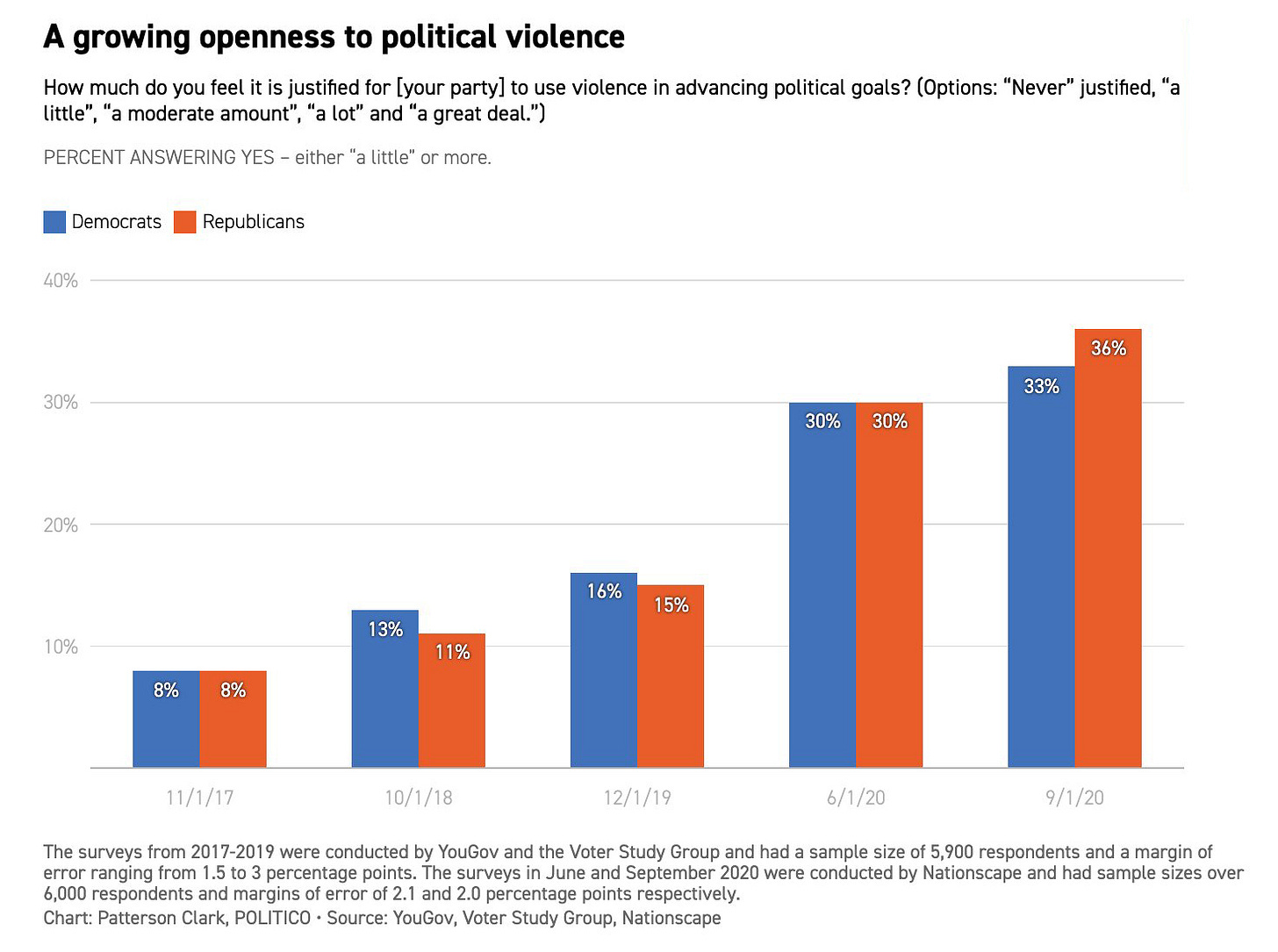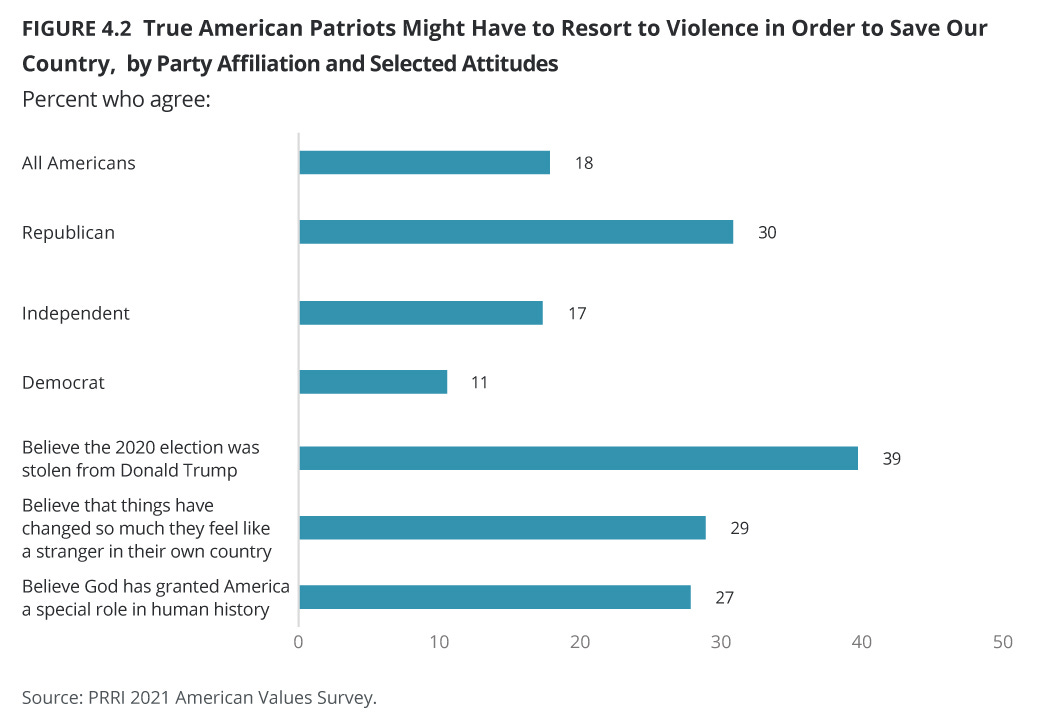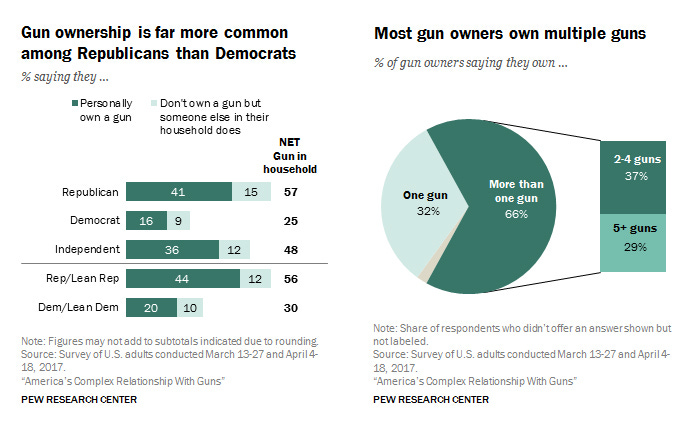
Political violence is bad. It’s surreal to type these words in 2021. Ten years ago, it would not have needed saying. Depressingly, it now does. Political violence is a growing problem in the United States. In 2016, a militia took over a wildlife refuge in Oregon, and one militant was killed when the feds moved in. At the 2017 “Unite the Right” rally in Charlottesville, Virginia, a white supremacist drove a car into a crowd of counter protesters, injuring dozens and killing one. In 2016, there were politically-motivated riots in Chicago, Sacramento, Milwaukee, Charlotte, and Oakland, among others. In 2017, Berkeley, Anaheim, and St. Louis. In the summer of 2020, riots raged across the country in the wake of the George Floyd killing, causing $1-2 billion in property damage and 25 deaths. In 2021, a mob attack on the US Capitol left five dead and the country shaken. And whatever the hell has been going on in Portland, Oregon on a near-continual basis for the past few years. I could go on.
What’s even more troubling than the increasing incidents of political violence are the shifting attitudes around it. The data fluctuates, but none of it is encouraging. A September 2020 poll found that 33 percent of Democrats and 36 percent of Republicans felt using violence to advance political goals was at least “a little” justified. A February 2021 survey found that 29 percent of Americans agreed at least somewhat with the statement: “If elected leaders will not protect America, the people must do it themselves even if it requires taking violent actions.” This included 39 percent of Republicans and 17 percent of Democrats. A whopping 36 percent of all respondents agreed that “use of force” is necessary to halt the decline of the American way of life. Most recently, a November 2021 poll showed 18 percent of Americans agreed with the statement “Because things have gotten so far off track, true American patriots may have to resort to violence in order to save our country.” This included 30 percent of Republicans, 17 percent of independents, and 11 percent of Democrats.
There’s no other way to spin this — Americans are warming to political violence. Cultural shifts have led to a more casual openness toward violence, where it’s now considered fair game by many to harass, intimidate, pelt, punch, or throw beverages on people in public if they have the wrong politics. The level of division and animosity is palpable. Everyone is now so polarized that their principles get overridden by tribalism. Many of the same people who think Kyle Rittenhouse is a murderer could not bring themselves to care about the Trump supporter shot and killed at a protest two months later. And vice versa. Many of the people who supported the actions of the Capitol rioters (as 45 percent of Republicans polled in its immediate aftermath did) were aghast at the barbarity of the George Floyd riots. And vice versa.
Attitudes precede action. For violence to spread, intensify, and get out of hand, the whole country need not take up arms. Even during some of the most violent moments of human history, violence was only ever carried out by a relative few. It is when the violence carried out by the few becomes condoned by the many that we tip over the precipice. There’s an easy answer, for once: a principled opposition to all political violence, rioting, and vigilantism, no matter who does it.
The increasing frequency and normalization of political violence sets a dangerous precedent. The more one side uses it, the more the other side will. It’s a feedback loop — violence begets violence. In stable, free societies, there is a shared trust that established institutional processes will peacefully resolve conflicts, solve problems, tackle challenges, and transfer power from one leader to the next. Violence shatters this keystone and creates an environment of instability and uncertainty, where authoritarianism and tyranny can flourish.
In a society where violence is seen as a standard, viable strategy to achieve political goals, dissenters sooner think to use force against their opponents rather than defeating them politically; and political leaders correspondingly sooner think to threaten, jail, or kill their opponents to protect their power. This is the soil from which strongmen grow and thrive. In such a society, people live in a state of constant psychological turmoil, in fear that their lives could be upended at any time. Not only does this kind of constant stress and worry make us less free, it’s a tax on people’s goodwill and cognitive function. If you thought the public was dumb to begin with, or that our collective mental health had taken a nosedive, you ain’t seen nothin’ yet. Fear is the mind-killer.
This is the road that you, dear reader, nudge us closer toward, however infinitesimally, when you engage in, incite, advocate, cheer, justify, support, condone, tolerate, see as normal, or hypocritically flip-flop regarding political violence. The whole point of civilization is to escape the law of the jungle, where the burliest unibrowed thug with the largest club takes whatever he wants because he kills anyone who’d stop him. Is that what you want to return to?
And a word to the wise for leftists with a soft spot for political violence: This is a fight you cannot win. The right wing is more open to violence, overwhelmingly more armed than the left, more spread throughout the country, and with more military training. Waking up this sleeping giant is suicide. The left should be doing everything in their power to de-escalate these tensions, and to strengthen the effectiveness and credibility of our institutions.
The failures of government and institutions have played a role in giving rise to the frustration, lack of trust, and populist energy that feeds into political violence. It’s the bare minimum for politicians to disavow violence with words. More consequentially, they must begin doing their jobs. A perpetual state of party-line do-nothing government gridlock sends the signal to the public that the official channels no longer work, and that they ought to start taking matters into their own hands. Politicians tend to lag years behind public opinion and societal trends. By the time our political class removes their heads from the well-worn spot inside their rectums, it may be too late. The gears of government must be properly oiled. If necessary changes become nearly impossible due to a government paralyzed by partisanship, corruption, and incompetence, people will increasingly turn to other, less democratic, more violent ways to achieve political goals. And we will all pay the price for it.
See also: “We Need Safe Spaces — From Politics”
Subscribe now and never miss a new post. You can also support the work on Patreon. Please consider sharing this on your social networks. You can reach me at @AmericnDreaming on Twitter, or at AmericanDreaming08@Gmail.com.







